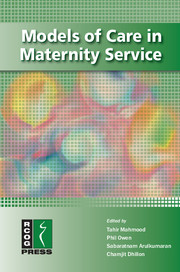Book contents
- Frontmatter
- Contents
- About the authors
- Abbreviations
- Preface
- CHAPTER 1 Setting the scene
- CHAPTER 2 Developing and implementing a local maternity services strategy: the clinical director's role
- CHAPTER 3 Prepregnancy services for women with social needs
- CHAPTER 4 Access to early pregnancy care
- CHAPTER 5 Antenatal fetal abnormality screening
- CHAPTER 6 Antenatal care for low-risk pregnancy
- CHAPTER 7 Antenatal care for women with pre-existing medical, obstetric or mental health conditions
- CHAPTER 8 Antenatal care for women developing medical or obstetric problems during pregnancy
- CHAPTER 9 Managing risk in antenatal care
- CHAPTER 10 Intrapartum care for women assessed as low risk in labour
- CHAPTER 11 Intrapartum care for high-risk pregnancies
- CHAPTER 12 Obesity in pregnancy
- CHAPTER 13 Prevention of hypoxic ischaemic encephalopathy
- CHAPTER 14 Risk management on the labour ward
- CHAPTER 15 Place of birth
- CHAPTER 16 High-risk pregnancy and neonatal services
- CHAPTER 17 Anaesthesia service provision for maternity services
- CHAPTER 18 Postnatal care
- CHAPTER 19 Supporting families who experience adverse outcomes during pregnancy
- CHAPTER 20 The maternity dashboard
- CHAPTER 21 Commissioning for regional maternity services: an example from the East of England
- CHAPTER 22 Key indicators
- Index
CHAPTER 19 - Supporting families who experience adverse outcomes during pregnancy
Published online by Cambridge University Press: 05 July 2014
- Frontmatter
- Contents
- About the authors
- Abbreviations
- Preface
- CHAPTER 1 Setting the scene
- CHAPTER 2 Developing and implementing a local maternity services strategy: the clinical director's role
- CHAPTER 3 Prepregnancy services for women with social needs
- CHAPTER 4 Access to early pregnancy care
- CHAPTER 5 Antenatal fetal abnormality screening
- CHAPTER 6 Antenatal care for low-risk pregnancy
- CHAPTER 7 Antenatal care for women with pre-existing medical, obstetric or mental health conditions
- CHAPTER 8 Antenatal care for women developing medical or obstetric problems during pregnancy
- CHAPTER 9 Managing risk in antenatal care
- CHAPTER 10 Intrapartum care for women assessed as low risk in labour
- CHAPTER 11 Intrapartum care for high-risk pregnancies
- CHAPTER 12 Obesity in pregnancy
- CHAPTER 13 Prevention of hypoxic ischaemic encephalopathy
- CHAPTER 14 Risk management on the labour ward
- CHAPTER 15 Place of birth
- CHAPTER 16 High-risk pregnancy and neonatal services
- CHAPTER 17 Anaesthesia service provision for maternity services
- CHAPTER 18 Postnatal care
- CHAPTER 19 Supporting families who experience adverse outcomes during pregnancy
- CHAPTER 20 The maternity dashboard
- CHAPTER 21 Commissioning for regional maternity services: an example from the East of England
- CHAPTER 22 Key indicators
- Index
Summary
Keywords
- Type
- Chapter
- Information
- Models of Care in Maternity Services , pp. 181 - 190Publisher: Cambridge University PressPrint publication year: 2010



